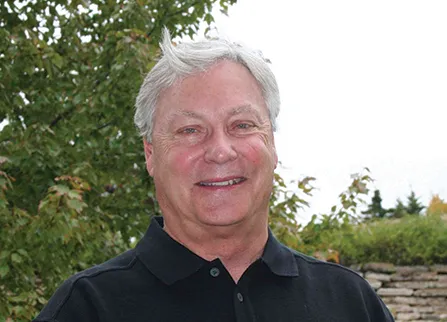Pottawatomie County farmer/stockman Glenn Brunkow entered the Capital Plaza Hotel in Topeka with his hair askew and his demeanor a bit dampened. In less than 10 minutes Brunkow was slated to speak on international trade and its impact on Kansas.
He quickly walked into the Sunflower Ballroom, shrugged off his hectic morning on the farm and shifted into the advocacy-for-agriculture role. His eyes twinkled, he flashed his trademark Brunkow grin and headed for the stage to greet the other members of the Kansas Farm Bureau-sponsored panel on trade.
In his opening statement to the more than 80 Kansas Press Association (KPA) members gathered for their annual meeting, Brunkow told them, “Trade is the lifeblood of Kansas farmers and ranchers. Without trade, we’re unable to market nearly half of the crops and livestock we produce.”
Speaking of ag production, Brunkow farms with his father north of Wamego. The family operation consists of soybeans, corn, wheat, hay, a cow herd and a small flock of sheep.
The fifth-generation farmer/stockman crawled out of bed early that Friday morning, Feb. 9, before heading to the KPA meeting in Topeka. Brunkow had livestock to feed and his sheep were lambing. One of the ewes struggled to give birth and the stockman called his veterinarian to help.
As soon as the vet arrived, Brunkow laid out the situation facing the momma ewe. Committed to speaking on the trade panel, Brunkow left the vet with his father and daughter to help and headed east.
Talk about commitment…
Brunkow firmly believes his farm organization is the most powerful voice for Kansas agriculture whether farmers and ranchers are lobbying elected officials in Topeka or Washington D.C., educating fourth graders on his family farm or addressing newspaper editors across Kansas about the importance of trade.
And while Brunkow headed to the KPA meeting, the situation back west on his farm had deteriorated. He learned the news in a phone call from his daughter a few minutes before he arrived in Topeka.
Fortunately, the first lamb out of the ewe lived. However, the second was lodged sideways and died during the birthing process. A third lamb died as well.
“I’ve never seen anything like it,” Brunkow says. “I knew we were in trouble, but I never imagined there’d be three lambs. So, I never even thought about the prospect of losing two babies.”
Loosing livestock of any kind represents one of the worst experiences that can occur on a farm or ranch. Like other stockmen, Brunkow looks at his stock every day he’s on his family farm.
He checks on their health, food and water. The stockman also looks to see how they’re progressing. Their condition.
“It’s an emotional attachment you have when you raise cattle, hogs, sheep, whatever you have in your operation,” Brunkow says. “These livestock live with you day in and day out. You’ve raised them from the first day they hit the ground until they’re producing calves or lambs in your herd. It’s a passion.”
And it’s constantly changing. Every day is a new day filled with challenges and successes. Still, Brunkow looks forward to these opportunities.
Like the rising sun, the Pottawatomie County stockman wakes up and looks forward to these opportunities. He’s excited about his livestock. He knows they rely on him to care for them.
They’re part of his life just like speaking on behalf of his vocation. Brunkow speaks to people about his crop and livestock operation because he’s committed to doing so.
As a spokesperson, he’s willing to do more, because it’s who he is.
By John Schlageck, Kansas Farm Bureau



